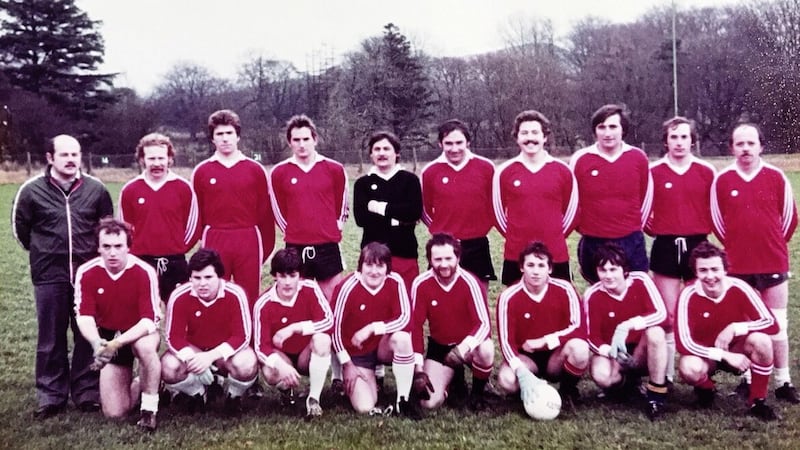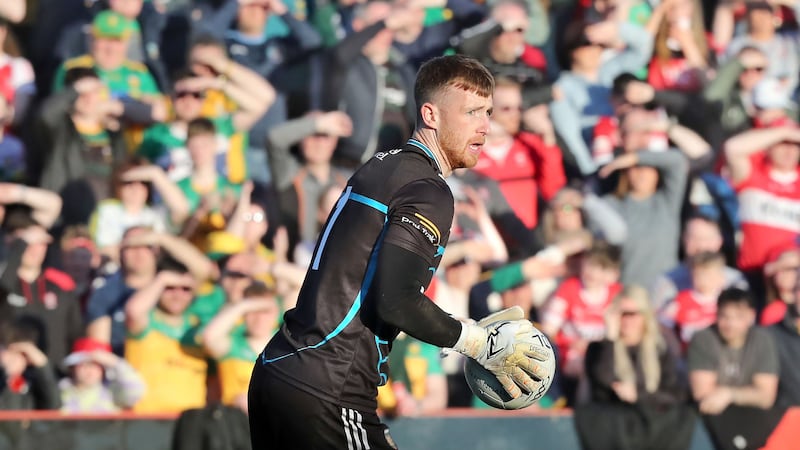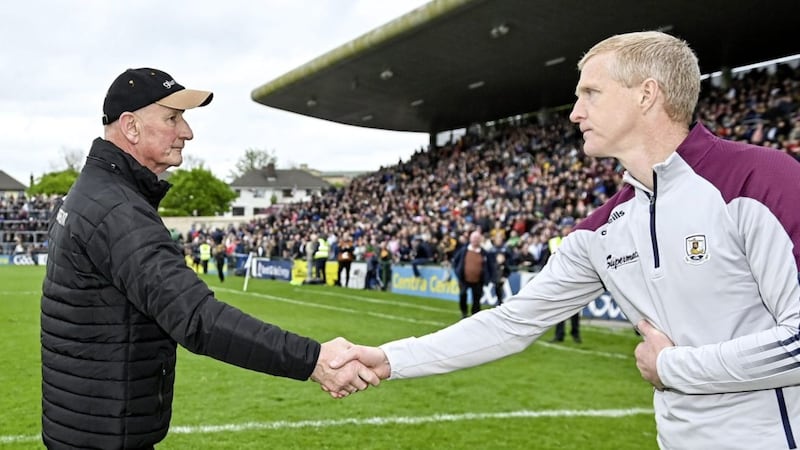THERE’S no longer a garage there, phased out and replaced by a 21st century Centra, but the people of Clady will still call it McCann’s Garage for a generation or two yet.
Willie John McCann ran the local mechanics shop along with his brothers Paddy and Des.
They’d set up 500 yards from the River Bann, on the Derry side of the Antrim border, and Willie John and his wife Alice decided to build right beside it.
Paul McCann was the second youngest of their seven children.
From he was no age at the primary school in Greenlough, he was into whatever sport he could get at.
As time wore on, it became predominantly about Gaelic football. He was damn good at it.
As a fourth year he was part of the St Pat’s Maghera panel that won the MacRory Cup and then lost eight players for their Hogan Cup campaign to the old age ruling.
They would lose the final by a single point to back-to-back winners Carmelite College, whose team contained future Galway legend Val Daly (whose son John plays today) and Mayo’s John Maughan.
It was one of four All-Ireland finals he would fall just short in.
When Danny Quinn joined the panel as a fifth year, McCann was in upper sixth. It was the Greenlough man’s fourth and final cut at it, having assumed the mantle of carrying the defence from number six.
The pair became friendly. On Saturday mornings when they were heading to games, Paul would get a lift from Clady into Bellaghy town, where Frank Quinn would rustle him up an egg and some toast before driving them to get a bus.
Equally, they loved it when Danny would call down to the garage and the squad of them would be out spinning yarns on the forecourt.
“He was some craic,” Danny laughs down the phone.
“He’d have arrived up at ours, could have been out anywhere the night before, could have been at anything.”
Finding himself in at corner-back two years early, they were playing St Pat’s Armagh when Quinn had his man held in the corner. An elbow here, a dig there, and suddenly he finds himself on the end of a punch to the face.
“Didn’t yer man get some hammering. James McGrath beat him, then Paul came in and nearly beat James out of the road to get at him.”
In the quarter-final, Armagh CBS tried and failed to do what everyone else in MacRory football had been trying and failing to do for four years – stop Dermot McNicholl.
Amid the darkness of the tunnel in Coalisland, Quinn recalls how “three or four boys went in by me” after the Maghera starlet.
“All you’d have seen was Dermot squaring up – he could handle himself – but out of nowhere, Paul McCann came flying through. Oh. My. God. He was small enough to be fit to swing in there. He gave an exhibition!
“But he wasn’t dirty. Never dirty. He was just hard. Anybody messed about, he sorted them out.”
He wouldn’t have been one for starting rows but he could have finished them.
Paul McCann felt it his duty to look after the younger players, just as his elder brothers had looked after him.
“A unique team-mate – as honest as the day is long,” recalls McNicholl, who likes him to the great DJ Kane of Down fame.
“You went into the trenches knowing they had your back. Loyalty, honesty and a never-say-die mentality.”
For him, Paul’s battle with the late Brian Conlan in a controversial final with Abbey CBS comes to mind, both for the manner in which he played and how he led.
“He was vice-captain of that team and I can still see him in the tunnel in Casement Park before the final when the Ulster Colleges came up what they thought was a good idea, letting both teams enter the ground like the Champions League final in soccer.
“Paul was leading from the front, the veins bursting from his forehead. That let the Abbey boys know what was ahead of them.”
Sifting through his brother’s box of medals upstairs at home, the eldest Tommy locates three MacRory winners’ medals and a runners-up one, along with a Corn na nÓg.
He would go on to win an Ulster minor (1981) and two U21 medals with Derry (‘83 and ’85), the second as captain on the day. They’d go on to narrowly lose All-Ireland finals after all three.
His football career would peak when he was wing-back on the team that won the Anglo Celt Cup in 1987.
Until a month ago when Niall Loughlin brought home a second, it was the only Ulster senior medal the club had ever won.
Thomas Eddie McCloskey, Charlie McErlean and Jimmy Cassidy had been on Derry’s 1947 National League winning panel. Enda Lynn would match that in 2008, while James Lynn (1989), Martin Carey and Ciaran McCallion (both 2002) won All-Ireland minor titles.
But Paul McCann was the best footballer Greenlough had produced in a long time. Perhaps ever.
If you wanted a sense of the all-round sportsman he was, it’s perhaps best served by his medal haul from 1980. In there beside a MacRory medal won as a fourth year and a Rannafast runners-up medal are an All-Ireland U16B hurling runner-up medal, an Ulster minor hurling medal and an Ulster Colleges hurling runner-up.
He’d played little hurling before it and played little after it, but was good enough to get himself on to those teams.
In some ways, he was built for hurling - absolutely fearless.
But football was in the breeding. Their uncle Ben was part of Bellaghy’s 1972 All-Ireland club football winning squad and the rest of the clan all played.
Amid their run of first and second cousins, you’ve the likes of former Derry men Fergal Doherty, Ciaran McNally, Joe Diver. On the Antrim side you had Tony Convery and a clatter of McCanns that were the backbone of Ballymena All Saints for a generation and provided Gerald, Barney, Peter and Paul for Saffron duty down the years.
At just 23 when Derry won that Ulster title, there seemed so much ahead of Paul McCann.
* * * * *
ELEVEN of the team that started against Meath in the 1987 All-Ireland semi-final climbed the steps to lift Sam Maguire six years later.
Joe Irwin, Paul John McCormick and Plunkett Murphy’s time ran out, but Paul McCann was 29 and ought to have been in his prime. Instead, he wasn’t even playing club football by then.
Greenlough would win a Derry junior title in 1986. Tommy McCann was on the team, though Sean missed out working in England at the time.
By that stage, their 22-year-old sibling had already become a target for the opposition.
“Paul’s problem was he went into tackles he shouldn’t have been going into. Too brave. We always said there was no reverse in him,” recalls their clubmate Mickey Lagan.
“He trained hard, and expected boys around him to train the way he trained,” adds Danny Quinn.
“Pushing at ye, c’mon, c’mon, even though it was killing him.”
The knees gave him bother and then the ankles started to take a hammering too.
When Paul helped coached Mickey’s minor team he was barely out of the grade himself, though the window was opened into why he both excelled and struggled.
“Paul had us contesting with the best of them, we were beating the Bellaghys and the Laveys. It stood to us. He instilled a lot of belief and grit into us and what the jersey meant.
“I always remember him saying to me that no matter who you are or what you think you are, that Greenlough jersey was there before us and it’ll be there after us, and nobody’s bigger than it.”
The club has really found itself in the last 15 years, but at that time they lacked for direction. They were bogged in the foothills of Derry football. Playing soccer for Portglenone on a Saturday and enjoying a few pints at the expense of Sundays remained the default position for the majority of young footballers.
McCann struggled with that. A ferocious trainer, he pulled the sled knowing fine well he had to but he shouldn’t have been.
Mickey Lagan wonders how different it all might have turned out for him if the club hadn’t ended up in that final in ’86.
Paul was club captain and they were to face Doire Colmcille. He was due to play it then head off then to America with Lagan, Malachy O’Rourke and Pascal Canavan to play for Young Irelands in Philadelphia.
The final went to a replay. The cut-off point for a sanction fell before the second date and so McCann, steadfastly committed to the club, never left.
“Paul had no time for the way things were. He could see there was no commitment and I could see it hurt him, big time,” says Lagan.
“I always remember thinking if Paul had come out to America, would he ever have come back home again?
“He would have loved it. Paul went to St Pat’s. Dermot McNicholl, Niall Mullan, those boys were very close, Rocky Conway from Glenullin. Those boys had all moved on, emigrated, and Paul was stuck in an oul rut at home.
“I always said the best place for Paul was to get away.”
He would listen to Bruce Springsteen and travelled to see him when he came to Ireland.
But he never got to ride through the mansions of glory or sweat it out on the streets of a runaway American dream.
The moment passed and never came around again. He was gone off the Derry scene within a year or two of ’87.
They’re not sure if it was exactly ’91 that he finished up, but he played full-forward in that year’s Derry junior final with Ballinascreen Thirds.
Greenlough were winning by a bagful and took off experienced men, collapsing at the feet of a hat-trick from Packie Farrell, almost 40 at the time.
At just 27, it was one of the last games Paul McCann ever played.
* * * * *
IT was 4am when Mickey Lagan’s phone rang. When he came off, he cried “like a child”.
October 29, 2000. Paul, like most of Greenlough, was at a wedding in the Tullyglass Hotel in Ballymena.
He was walking home and only in Gracehill, still on the first leg of the nine-mile hike, when a bus pulled in to lift him. Paul McCann stepped out to cross and a car came out from behind the bus to overtake and knocked him down, killing him at the age of just 36.
Their family bore more grief than any clan should ever wear on its shoulders, from the death of 12-year-old Dermot in 1978 through the loss of brothers Sean (37), Paul (36) and Seamus (40) all within four years of each other.
When Paul died, neighbours Bellaghy were a week out from an Ulster Club final in which they beat Errigal Ciaran.
He’d had friends there and in Greenlough and right around the place.
Mickey Lagan cried like a child when he heard the news because two weeks before he died, they’d fallen out and hadn’t made up.
Lagan was thick over a game when McCann came into Clady Bar and hit him a playful thump on the back. It heated and cooled quickly but a week later when the Greenlough players did their annual visit to the local bar of their final day opponents, McCann went with the rest to the Cosy in Lavey, while Lagan went to Baldies’ instead.
“I remember Louis Downey was telling me at the wake that him and Paul went into Baldies’ looking for me to get me a drink.”
He knows they’d have mended it very handy, but they never got the chance. That stays with him.
But what sticks mostly is the image of Paul McCann togged out and manning his wing.
Bull-strong, fearless beyond what was good for him, a classy left-footer who could put the ball on a sixpence, it was a shame his football career was so short.
“Very pacy over a short distance, real commitment to the ball. He was a left-footed player and very accurate,” said his former team-mate Bernie Henry.
Paddy McErlean was a few years behind him with school and club, playing on MacRory teams towards the mid-80s. He recalls “a natural leader but more by actions than words.”
Others likened him to a God around the place.
He took in to golfing a bit at Kilrea, where an annual competition has been held in his name since.
The loss of his talent to injuries at such an early stage was sore on Greenlough.
But the loss of the character and life and drive and energy he brought to the place remains immeasurable.








